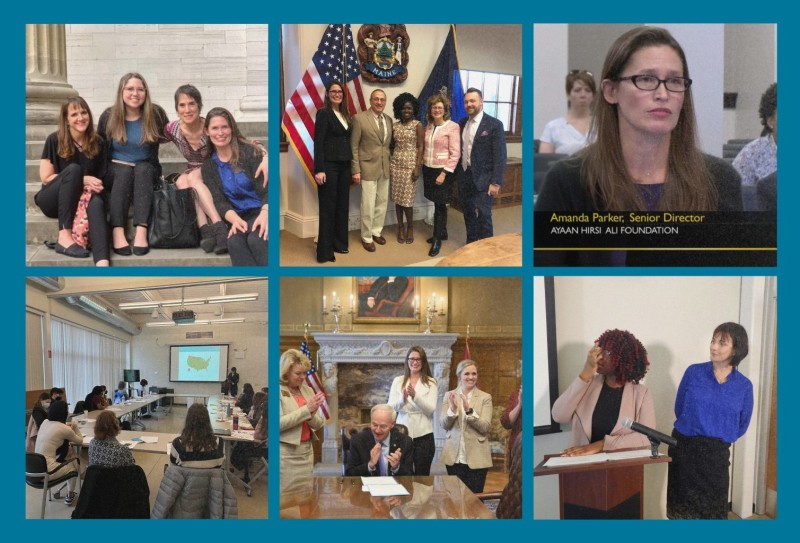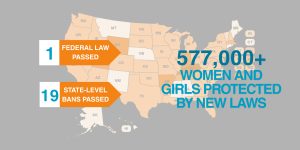18 Years of Impact in the Fight Against FGM

October 9, 2025
For nearly two decades, AHA Foundation has led the fight to end female genital mutilation (FGM) in the United States—a hidden abuse that robs children of their safety and dignity. From shaping landmark laws to training thousands of frontline professionals, and from supporting survivors to closing dangerous loopholes, we have worked relentlessly to create a future free from FGM. Each step forward has been hard‑won, but together they tell a story of resilience, progress, and what becomes possible when we unite to end FGM.
Closing the “Vacation Cutting” Loophole
In 2013, a dangerous gap in U.S. law came into focus: families taking girls abroad to undergo FGM. AHA Foundation’s founder, Ayaan Hirsi Ali, and our legislative team worked directly with Representative Crowley (NY) to highlight the urgency of this issue. That advocacy helped shape a federal amendment signed into law by President Obama, making it illegal to knowingly transport a girl out of the country for this purpose.
Reaffirming Federal Protections
Five years later, in 2018, a devastating court ruling struck down the federal law against FGM as unconstitutional, leaving prosecutors unable to try perpetrators under federal statute. Girls across the country were suddenly more vulnerable. AHA Foundation mobilized, working with allies from both parties in Congress to restore protections. Our advocacy helped shape and push forward the Stop FGM Act of 2020, which passed unanimously in both chambers and was signed into law by President Trump on January 5, 2021—reaffirming America’s commitment to protect girls from this abuse.
I was so thankful to hear that Congress has passed a federal law banning FGM. This will be life-changing for girls that are at risk in this country, and for moms wanting to protect girls from this practice within their communities but didn’t have anything to help them in that fight to protect them
Jenny, an FGM survivor and advocate from Kentucky
As we’re wrapping up this Congress, it’s certainly encouraging to see that we’ve made progress in eliminating the horrific practice of female genital mutilation. FGM is an uncomfortable issue to discuss, but we must continue calling attention to it and educating ourselves on the signs so that we are equipped to protect young girls from this excruciating practice.
Joni Ernst, Senator from Iowa
Expanding Protections Through VAWA
Building on the momentum of the Stop FGM Act of 2020, our advocacy pressed forward. For years, AHA Foundation had worked alongside allies to push for the reauthorization of the Violence Against Women Act (VAWA), which had lapsed in 2018. We not only fought for its renewal but also for it to explicitly recognize FGM and forced marriage.
That persistence paid off. In March 2022, President Biden signed the reauthorized VAWA into law, and for the first time, FGM and forced marriage were defined under this landmark legislation.
State-Level Breakthroughs: Building Momentum Across America
While federal protections are essential, laws at the state level provide additional safeguards to ensure that girls are protected from FGM. Over the past decade, momentum spread across the country, and AHA Foundation was there every step of the way—providing model legislation, testimony, and advocacy that turned proposals into protections.
 Early Pioneers (2012–2014): The state‑level movement began with Louisiana and New Jersey, where the AHA’s model legislation helped eliminate dangerous loopholes. In 2012, Louisiana became one of the first states to criminalize both FGM and the removal of girls from the state for cutting. That same year, New Jersey became a leader in the Northeast by introducing the AHA model FGM legislation, which was signed into law in 2014. Kansas passed its own law with strong extraterritorial provisions—legislation AHA supported through written testimony that helped secure its passage in 2013.
Early Pioneers (2012–2014): The state‑level movement began with Louisiana and New Jersey, where the AHA’s model legislation helped eliminate dangerous loopholes. In 2012, Louisiana became one of the first states to criminalize both FGM and the removal of girls from the state for cutting. That same year, New Jersey became a leader in the Northeast by introducing the AHA model FGM legislation, which was signed into law in 2014. Kansas passed its own law with strong extraterritorial provisions—legislation AHA supported through written testimony that helped secure its passage in 2013.
Expanding Protections (2015–2017): Momentum grew quickly. South Dakota overcame concerns that a ban on FGM would infringe on religious freedom, thanks to the AHA’s advocacy, and the ban was passed in 2015. In Texas, after Ayaan Hirsi Ali’s national media appearance, Senator Jane Nelson championed sweeping reforms—outlawing “vacation cutting,” penalizing parents and guardians who have their child undergo the procedure, and making clear culture cannot be used as a defense for the practice. The legislation went into effect in 2017. Around the same time, Michigan passed what was then the strongest state FGM legislation in the nation, with AHA’s Senior Director, Amanda Parker, providing resources and advice on the bill and testifying before lawmakers to secure its passage.
Amanda at the AHA Foundation was a tremendous partner in our bipartisan legislative effort in Michigan to address female genital mutilation. We worked hand in hand with her to develop our multi-bill package and refine the bills to be as effective as possible.
Stephanie Chang, State Representative in Michigan’s House of Representatives
A Wave of New Laws (2018–2020): From New Hampshire to Ohio, Arkansas, Utah, Idaho, and Tennessee, AHA’s guidance, education, model legislation, and testimony helped states strengthen or adopt bans. In Pennsylvania, years of collaboration with Representative Thomas Murt culminated in a 2019 victory. North Carolina followed soon after, with Senator Joyce Krawiec partnering with AHA to make FGM a felony offense. By 2020, Wyoming and Kentucky had enacted some of the most comprehensive bans in the nation, with Kentucky’s law shaped by both AHA and a local survivor’s testimony and based on AHA’s model legislation.
Some people may think 551 girls is just a small number, but to me it was an alarming number and I knew I had to make a change.
Breanne Davis, Arkansas State Senator
Long-Term Advocacy Wins (2020–2025): Some victories took years of persistence. In Massachusetts, AHA worked alongside the Massachusetts Women’s Bar Association for seven years to pass comprehensive legislation in 2020. In Washington State, AHA’s legal research helped shape one of the most robust and multifaceted laws in the country, passed in 2023. Following six years of tireless advocacy in Washington, D.C., where our Director of Policy and Women’s Programs, Michele Hanash, joined survivors and allies in testimony, AHA celebrated a 2025 landmark victory safeguarding more than 3,000 women and girls in the nation’s capital.
I hope that national momentum can build from what we are doing here in Washington so that we can ban FGM nationwide and send a message to the world that abuse against women of any kind will not stand in America.
Senator Michael D. Brown, Shadow U.S. Senator DC
Training the Frontlines
Laws alone cannot protect girls unless professionals know how to engage with communities and recognize and respond to FGM. That’s why, beginning with our very first training in 2016, AHA has trained 7,754 frontline service providers—including doctors, nurses, teachers, and social workers—on how to identify and address FGM.
Our leadership was further demonstrated when AHA Foundation delivered the first‑ever federal training on FGM in the United States—a milestone that underscored our role as the national leader in equipping professionals to protect girls. We’ve trained more frontline professionals than any other non‑governmental organization in the U.S., earning collaborations with the American Medical Association, American Bar Association, and American Association of Nurse Practitioners.
I can’t believe that this many girls are at risk in the community where I am a school counselor. I am happy to be educated about the prevalence of FGM/C, so I can be a part of fighting to eradicate it.
Attendee of one of our Chicago trainings
Direct Support for Survivors
Beyond policy and training, AHA has stood with survivors and those at risk. Through our email-based helpline and Crisis Text Line, we have directly helped 970 individuals—including FGM survivors and women facing other forms of abuse—find safety, resources, and hope.
Female genital mutilation is not something that just goes away. It is something a person will carry with them every day in some way… If it’s never talked about, it’s not going to end. Silence keeps the practice going until it is exposed to the light.
— Jennifer, U.S. survivor of FGM
Federal Recognition and Resources for Survivors
Our leadership has been recognized through two federal grants—awarded in 2021 and 2024— for our work in Chicago, where we have built partnerships with local organizations and professionals to strengthen protections for girls in at-risk communities.
We also produced 18 state-specific legal guides to help survivors understand their rights and seek justice. These guides empower women and families with the knowledge they need to navigate complex legal systems.
Advancing Knowledge Through Groundbreaking Research
Our anti-FGM initiatives are both evidence-driven and survivor-guided. We believe that lasting change must be rooted in data as well as the realities survivors face every day.
In October 2023, we released a landmark study on FGM/C trends in the United States, conducted by Sean Callaghan, a PhD candidate at the University of Leicester, with AHA’s support. His three‑year analysis estimated that in 2019, up to 577,000 women and girls were living with FGM/C, with at least 31,000 girls at risk. The study revealed that while most survivors were born overseas, the majority of those at risk were U.S.‑born—and overwhelmingly of elementary school age or younger. These findings underscored the urgent need for prevention, survivor services, and stronger state laws.
The study has already influenced national conversations and equipped policymakers with the evidence they need to act. Praised by the Department of Justice for its impact, it affirmed the critical role of data in protecting girls. In recognition of this achievement—and his broader contributions to ending FGM—Sean received the Global Woman Award in September 2025 from the Global Woman P.E.A.C.E. Foundation.
By building strong relationships with communities, we ensure that the changes we create are not only powerful on paper but also sustainable in practice. This survivor-centered, research-driven approach has positioned AHA as the foremost authority in the fight against FGM.
The Impact
The impact of this work can be measured not only in laws passed but in lives changed. Federal victories have restored protections once lost, state reforms have closed loopholes, and thousands of professionals now know how to recognize and respond to FGM. Survivors have found support through our helplines, and communities have gained resources to seek justice and build resilience. Each milestone represents more than policy—it represents a girl safeguarded, a survivor heard, and a community strengthened.
Call to Action
These victories prove that change is possible—but only when we refuse to stay silent. Every law passed, every professional trained, and every survivor supported has been made possible by people like you who stand with us. Now, as we fight for an Executive Order to enforce the Stop FGM Act of 2020 fully, we need your voice more than ever.
Join us today—add your name, share this campaign, and help us protect every girl in America from FGM.

